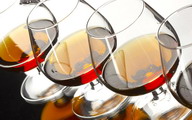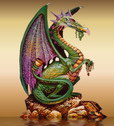Coffees from all over the world
11 posts • Page 1 of 1
Coffees from all over the world
GM to all our forum members! How is it going? Hope all is well  Ok, so I decided to open this topic since no one wants to do it
Ok, so I decided to open this topic since no one wants to do it  Have you ever reflected upon the origin of the coffee you drink, where it comes from, why coffee from African regions has winy aftertaste whereas coffees from Latin America are mostly full-bodied. Thus coffees from various regions differ from each other and still have something in common if speaking about coffee from one geographical zone. What is your opinion about that? Do you think the same or it doesn't matter to you? Waititng for some thoughs:)
Have you ever reflected upon the origin of the coffee you drink, where it comes from, why coffee from African regions has winy aftertaste whereas coffees from Latin America are mostly full-bodied. Thus coffees from various regions differ from each other and still have something in common if speaking about coffee from one geographical zone. What is your opinion about that? Do you think the same or it doesn't matter to you? Waititng for some thoughs:)
Yeah, that's me 

-

administrator - Site Admin

- Posts: 17
- Joined: 14 Oct 2009, 23:52
Re: Coffees from all over the world
Hey guys! I did reflect upon this theme and it is really very interesting. I personally think everything depends on the climate of the country the coffee is grown in, the weather conditions, the soil, the way and methods of growing, harvesting and processing. I think we all remember the Kaldi shepherd legend where his goats first found the cofee bush and what happened to them after that. The herdsman was from Ethiopia, it is the coffee's historical region. Coffee reached Europe not until the 17th century and only in the mid 18th century it came to latin America. So you can imagine the coffee has one root that comes from Arabia, however with time it began mutating under the influence of some climate difference, wheather changing, the soil and many other factors have set apart the coffee beans that used to be one and the same. That's my theory and I think it has right to existence no matter how weird and improbable it may seem. Thank you a lot for being attentive to my point of view 
Coffee is the best thing to douse the sunrise with
-

michael - old member

- Posts: 124
- Joined: 10 Dec 2009, 02:27
Re: Coffees from all over the world
hmm... May I suggest that the plant may be affected by the character of the nation growing it? The way people treat it..
My 2 cents
My 2 cents
Caffeine isn't a drug, it's a vitamin!
-

ginga - old member

- Posts: 100
- Joined: 21 Dec 2009, 00:53
- Location: US
Re: Coffees from all over the world
I would say that coffee is like the people who grow them. Different people use different kinds of soil and fertilizer to grow the coffee. This, I think, is the reason why coffee have different tastes.
I've seen an episode about planting coffee in Hawaii on the show Dirty Jobs. They use natural fertilizers from donkey dung, decaying leaves, and biodegradable wastes from their food. This coffee has a different flavor compare to the conventional coffee that they are planting.
I've seen an episode about planting coffee in Hawaii on the show Dirty Jobs. They use natural fertilizers from donkey dung, decaying leaves, and biodegradable wastes from their food. This coffee has a different flavor compare to the conventional coffee that they are planting.
- Krimer
- newbie

- Posts: 5
- Joined: 18 Feb 2010, 21:25
Re: Coffees from all over the world
You have some reason, Krimer
Everything not only coffee depends on various things but first of all on people and conditions surrounding it....
Everything not only coffee depends on various things but first of all on people and conditions surrounding it....
Coffee is the best thing to douse the sunrise with
-

michael - old member

- Posts: 124
- Joined: 10 Dec 2009, 02:27
Re: Coffees from all over the world
WoW! ...
I didnt know that coffee from African regions has winy aftertaste whereas coffees from Latin America are mostly full-bodied
what more surprises has coffee?
I didnt know that coffee from African regions has winy aftertaste whereas coffees from Latin America are mostly full-bodied
what more surprises has coffee?
I don't have a problem with caffeine. I have a problem without caffeine!
-

CrazyBaby - old member

- Posts: 118
- Joined: 23 Dec 2009, 07:58
- Location: Alkatraz City
Re: Coffees from all over the world
Hello! I want to add some new to this topic =)
The Different Types of Coffee From All Over The World By Darren Williger
The drinking of coffee is a very common practice the world over. This is usually aided by a lot of things, such as the presence of coffee shops at every street corner in different countries. A lot of countries in tropical locations of the world grow some of the world's best coffee. Coffee can easily grow in locations that are at some distance above sea level. Because of this fact you usually find different types of coffee which can satisfy different tastes. The best forms of coffee however are those that a grown on especially high locations such as mountainous yet tropic regions. A large number of countries in the world make coffee but these are some of the major countries that do so:
Brazil
Brazil has one of the oldest coffee traditions in the world as coffee growing came to Brazil in the 1700's. Currently they are the world's forerunners in the production of the world's most coffee. 1 out of every 4 cups of coffee that is drunk in the world today is of the Brazilian kind of coffee. Most of the coffee beans in Brazil are of the Arabica kind. In terms of specialty coffee Brazil is also quite popular. You have different farms growing these forms of specialty coffee: Bourbon, Typica, Caturra and Mundo Novo.
Brazilians harvest their coffee produce in the months between March and October. The coffee may be harvested by manual or mechanical means. Weather conditions may also affect the harvesting of coffee as the harvesters may also choose to use dry or wet methods in order to process their coffee.
Columbia
Columbia supplies the world's second largest quantities of coffee after Brazil. Over 12% of the total coffee that is drunk in the world today has it's origins in Columbia. Different types of Columbian coffee are available and they are usually very rich in flavor and are thick and have a slight acid content. They also have wonderful smells too.
Columbians usually harvest their coffee in the months between October and February. They also have another harvesting period which is between April and June. Different brews of coffee grown here include: Bourbon, Typica, Caturra and the Maragogype brands.
Mexico
Mexico had its first coffee plants planted towards the end of the 1700's. Most of the coffee types grown in Mexico are of the simpler kinds. They are usually used as bases for blending. Farms in Mexico grow different brands such as the: Bourbon, Mundo Novo, Caturra and Maragogype brands.
Guatemala The climate of this country usually varies due to the topography and the location of the country. Because of this reason the country has different clear-cut versions of coffee. These coffee beans are harvested at different times of the year but the major harvesting period is usually between October and January.
Indonesia and New Guinea Coffees which come from this region are usually called Sumatran coffees. These coffees are so smooth and yet they are intrinsically complex. Some of the most popular brands of coffee here are the Mandheling and Lintong types of coffee.
Honduras Coffees grown in Honduras are quite simple coffees. They are usually used as bases for other blends. Most Honduran coffee is usually harvested in the months between October and March. The wet process method of harvesting coffee is usually used to harvest Honduran coffee. Honduran types of coffee make different types of coffee such as: Bourbon, Caturra and Typica coffee brands.
Ethiopia
Ethiopia usually has some of the best coffee brands in the world over. People usually see Ethiopian coffee as one of the most unique and intriguing types of coffee brands in the whole world. Ethiopia grows these three types of coffee:Ghimbi, Harrar and the Sidamo . These coffees taste somewhat fruity and have very powerful aromas and thickness as well.
Other countries also produce some coffee brands or the other and these countries include Costa Rica, Dominican Republic, Ecuador, Haiti, Jamaica, Kenya, Malawi, Nicaragua, Tanzania, Uganda as well as Venezuela.
Article Source: http://EzineArticles.com/?expert=Darren_Williger
The Different Types of Coffee From All Over The World By Darren Williger
The drinking of coffee is a very common practice the world over. This is usually aided by a lot of things, such as the presence of coffee shops at every street corner in different countries. A lot of countries in tropical locations of the world grow some of the world's best coffee. Coffee can easily grow in locations that are at some distance above sea level. Because of this fact you usually find different types of coffee which can satisfy different tastes. The best forms of coffee however are those that a grown on especially high locations such as mountainous yet tropic regions. A large number of countries in the world make coffee but these are some of the major countries that do so:
Brazil
Brazil has one of the oldest coffee traditions in the world as coffee growing came to Brazil in the 1700's. Currently they are the world's forerunners in the production of the world's most coffee. 1 out of every 4 cups of coffee that is drunk in the world today is of the Brazilian kind of coffee. Most of the coffee beans in Brazil are of the Arabica kind. In terms of specialty coffee Brazil is also quite popular. You have different farms growing these forms of specialty coffee: Bourbon, Typica, Caturra and Mundo Novo.
Brazilians harvest their coffee produce in the months between March and October. The coffee may be harvested by manual or mechanical means. Weather conditions may also affect the harvesting of coffee as the harvesters may also choose to use dry or wet methods in order to process their coffee.
Columbia
Columbia supplies the world's second largest quantities of coffee after Brazil. Over 12% of the total coffee that is drunk in the world today has it's origins in Columbia. Different types of Columbian coffee are available and they are usually very rich in flavor and are thick and have a slight acid content. They also have wonderful smells too.
Columbians usually harvest their coffee in the months between October and February. They also have another harvesting period which is between April and June. Different brews of coffee grown here include: Bourbon, Typica, Caturra and the Maragogype brands.
Mexico
Mexico had its first coffee plants planted towards the end of the 1700's. Most of the coffee types grown in Mexico are of the simpler kinds. They are usually used as bases for blending. Farms in Mexico grow different brands such as the: Bourbon, Mundo Novo, Caturra and Maragogype brands.
Guatemala The climate of this country usually varies due to the topography and the location of the country. Because of this reason the country has different clear-cut versions of coffee. These coffee beans are harvested at different times of the year but the major harvesting period is usually between October and January.
Indonesia and New Guinea Coffees which come from this region are usually called Sumatran coffees. These coffees are so smooth and yet they are intrinsically complex. Some of the most popular brands of coffee here are the Mandheling and Lintong types of coffee.
Honduras Coffees grown in Honduras are quite simple coffees. They are usually used as bases for other blends. Most Honduran coffee is usually harvested in the months between October and March. The wet process method of harvesting coffee is usually used to harvest Honduran coffee. Honduran types of coffee make different types of coffee such as: Bourbon, Caturra and Typica coffee brands.
Ethiopia
Ethiopia usually has some of the best coffee brands in the world over. People usually see Ethiopian coffee as one of the most unique and intriguing types of coffee brands in the whole world. Ethiopia grows these three types of coffee:Ghimbi, Harrar and the Sidamo . These coffees taste somewhat fruity and have very powerful aromas and thickness as well.
Other countries also produce some coffee brands or the other and these countries include Costa Rica, Dominican Republic, Ecuador, Haiti, Jamaica, Kenya, Malawi, Nicaragua, Tanzania, Uganda as well as Venezuela.
Article Source: http://EzineArticles.com/?expert=Darren_Williger
Some things in life are better rich. . . coffee, chocolate, men.
-

Nicky - old member

- Posts: 143
- Joined: 08 Feb 2010, 02:52
- Location: Why, Arizona, USA
Re: Coffees from all over the world
It's such an interesting topic  I like coffee from Columbia or Brazil the best.
I like coffee from Columbia or Brazil the best.
 I like coffee from Columbia or Brazil the best.
I like coffee from Columbia or Brazil the best.-

PepetheCoffeeManiac - member

- Posts: 98
- Joined: 06 Mar 2012, 07:32
Re: Coffees from all over the world
I prefer coffee from African regions - it sounds more tasty and rich-flavored to me, as compared to those from Latin American regions.
Coffee & Love Taste Best When Hot
-

jennyffer777 - old member

- Posts: 127
- Joined: 11 Jan 2010, 02:40
Re: Coffees from all over the world
administrator wrote:GM to all our forum members! How is it going? Hope all is wellOk, so I decided to open this topic since no one wants to do it
Have you ever reflected upon the origin of the coffee you drink, where it comes from, why coffee from African regions has winy aftertaste whereas coffees from Latin America are mostly full-bodied. Thus coffees from various regions differ from each other and still have something in common if speaking about coffee from one geographical zone. What is your opinion about that? Do you think the same or it doesn't matter to you? Waititng for some thoughs:)
Hey! I completely agree with you, it do happen. Since now I have tried coffee from many different areas and they actually differ!
Isn't it interesting? I love it, this make my love for coffee much more stronger

-

jessebrock73 - newbie

- Posts: 15
- Joined: 14 Jan 2016, 20:22
Re: Coffees from all over the world
I'm thinking about looking for a monthly delivery of different coffees like this and this thread had made me even more interested!
- adam22
- newbie

- Posts: 3
- Joined: 15 Feb 2016, 10:49
11 posts • Page 1 of 1
Who is online
Users browsing this forum: No registered users and 0 guests
